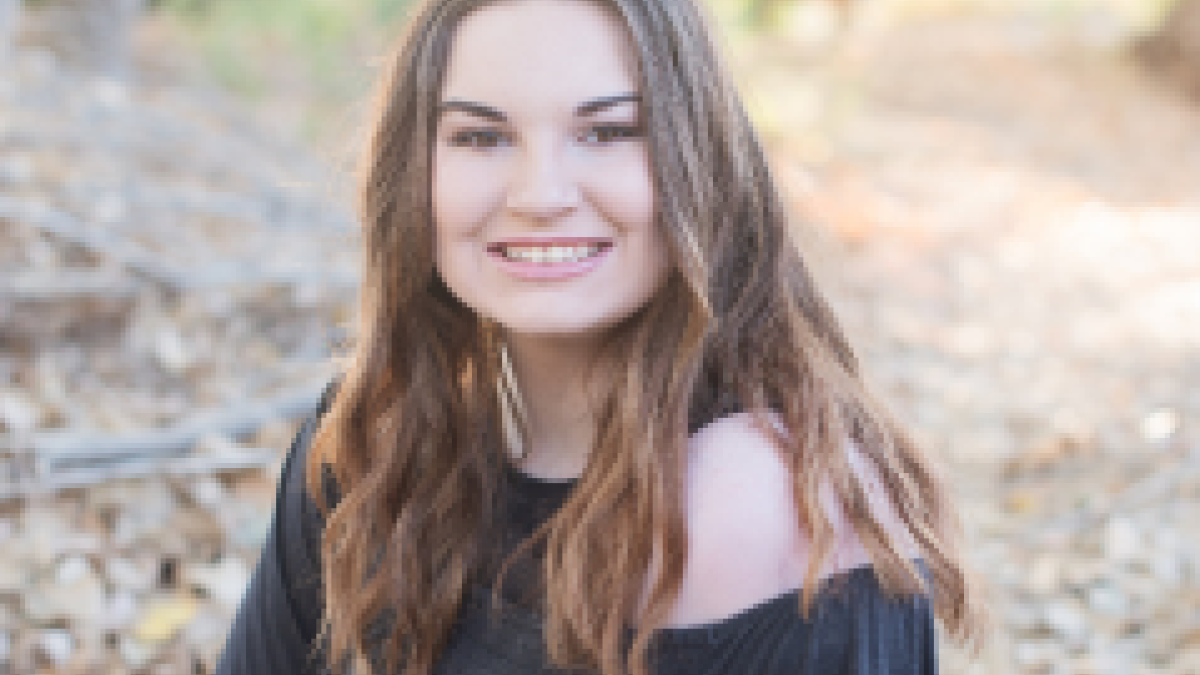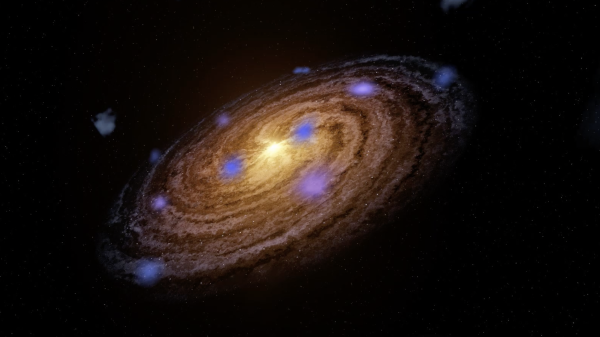Outstanding applied biological sciences graduate: 'I hope to work at the CDC'

Natalie Alexander has been simultaneously enrolled in the Master of Science in applied biological sciences degree while finishing her undergraduate major in this program at ASU's Polytechnic campus.
Editor's note: This story is part of a series of profiles of notable fall 2020 graduates.
Natalie Alexander of Queen Creek, Arizona, was younger than usual when she began attending ASU, having graduated early from high school.
“As a freshman it felt as if everything was new,” Alexander remembered. “But being responsible for my own success was not something I took lightly.”
She enjoyed her first few classes in her major — applied biological sciences at ASU's Polytechnic campus — but the further along she got in her program the more she realized that her college experience would be what she made of it.
For Alexander, it was getting involved in research projects that really changed her trajectory.
“I’d originally thought that the next step for me might be medical school, but I began to realize that research was my passion,” she said. “From there, I really started tailoring my experiences to support that.”
Alexander’s interest in research was first piqued her sophomore year when she took the course ABS 494: Emerging Infections and Epidemics with Professor Marianne Moore.
“In writing a research paper, I chose to dive into the opioid epidemic, specifically HIV infections in those with substance abuse disorders,” she explained.
“During the writing I really wanted a firsthand look into the treatment process and the contributing factors to infection spread that I wouldn't be able to fully grasp just from reading articles,” said Alexander. “I reached out to a few substance abuse treatment centers and secured shadowing time with the physicians. I was able to get a more in-depth understanding of how the treatment process assists individuals, and of the impact of the opioid epidemic in my community.”
She said that experience of being "in the field" really stirred an interest in wanting to be involved in more research projects.
When applying to projects, she was especially drawn to research opportunities that were interdisciplinary. She first worked on a project in ASU’s School for the Future of Innovation and Society, and then later two projects in the School of Human Evolution and Social Change.
Alexander said each project helped her hone her quantitative and qualitative research skills.
Now, two years later, she’s on a research team that is writing a paper on the opioid mortality rates in Arizona — “a true full-circle moment,” she observed.
Alexander has been simultaneously enrolled in the Master of Science in applied biological sciences degree while finishing her undergraduate major through a 4+1 program. Her master's applied project is focused on HIV infection rates in urban and rural communities.
Since January 2019, Alexander has served as an ambassador in the College of Integrative Sciences and Arts, assisting the college’s recruitment, outreach and engagement team and serving as a peer resource to prospective and current students.
She counts as highlights of her ambassador experience organizing service events, such as an all-campus Thanksgiving food drive to help feed local families, and participating as a student guest and then co-host on the college’s podcast, "The Buzz,” along with serving as the vice president of the CISA Ambassadors student group.
“The longer I'm at ASU the more I strive to embody our charter — both on-campus and off,” noted Alexander.
She shared these additional reflections with ASU Now.
Question: What’s something you learned while at ASU — in the classroom or otherwise — that surprised you or changed your perspective?
Answer: While at ASU my perspective and view of the world began to shift to look more at the community I was in. I began to realize how impactful we can be with our words, our actions, and what plans we have to better benefit others. We are able to change the world for the better, just by bettering ourselves and positively influencing those around us.
Q: Which professor taught you the most important lesson while at ASU? And what was it?
A: Dr. Marianne Moore was one of the most influential people I met while at ASU, and I know that her guidance was invaluable to me as a student and as a person. She truly represents the best of the best as far as professors go. Not only does she teach her students to understand the materials, but she also consistently shows that there is a balance to be had in life. It can seem as if school is all-consuming, but she emphasized that if that is at the expense of your mental health, that is not OK.
I want to thank Dr. Moore for encouraging me to pursue the research I was interested in, regardless of barriers. Dr. Moore was impactful because she not only lived out the ASU charter, but also helped students find their way in times which can seem overwhelming and never-ending.
I’m also forever indebted to Julie Lim (senior coordinator for student engagement in the College of Integrative Sciences and Arts). Julie not only consistently went above and beyond to ensure that students were aware of opportunities and resources at ASU, but she also led an amazing ambassador program, which I am proud and honored to have been a part of. Without her leadership I’m not sure that my experience would have been the same at ASU.
Q: What’s the best piece of advice you’d give to those still in school?
A: College is what you want it to be! As cliché as it sounds, what really helped me embrace all the opportunities ASU had to offer was seeking out what I wanted from ASU. Whether it was a research position, more student representation, or a guest spot on a panel, I knew that if I wanted it I could get it.
Q: Did you have an internship or research project during your time at ASU that was important to you?
A: One research project I worked on was looking at growth opportunities for detained youth. I was able to visit a detention facility in the Valley and conduct interviews with youth about life, school and their future plans. It was eye-opening how important a support network is, whether it's family, friends, co-workers or even neighbors. While pursuing this research I could feel the shift in my personal attachment to the individuals I interviewed. I'm forever grateful to the professors who oversaw the research project, because not only did I develop critical research skills, but it made me even more thankful for the experiences I had at ASU, and to want to be able to give back to vulnerable populations who are needing more resources and support from the community.
Q: What was your favorite spot on campus, whether for studying, meeting friends or just thinking about life?
A: Nine times out of ten I would be in the Polytechnic campus Student Union studying with friends while drinking Starbucks. It was a running joke that friends could find me before or after class on any given day in the Starbucks line.
Q: What are your plans after graduation?
A: I will complete the last year of my master’s in applied biological sciences at ASU through the 4+1 program, and then I hope to work at the CDC in Atlanta.
Q: If someone gave you $40 million to solve one problem on our planet, what would you tackle?
A: A cause extremely important to me is the foster care system. At seven days old my youngest brother was placed with my family as a foster child along with my sisters, who were both under two at the time. I'm thankful my parents were able to adopt all three, who will forever be a valuable part of our family! But the process of being a foster family highlighted the lack of support and resources for youth in the foster care system. I was blessed to have been able to have parents who guided me in furthering my education and always supported my love of learning, but the resources I had may not have been available to my three younger siblings under different circumstances.
With $40 million I would invest the money in educational programs that would provide foster children at any age access to tutoring and school resources — and for teens wanting to go to college, guidance with their college applications along with application fee waivers. Even if I never have the opportunity to devote $40 million to this cause, I want to be able to focus on my local community and set up a system for application waivers. As a lifelong learner, I absolutely loved the academic experience of attending college and do not want this opportunity to be out of reach for youth who are in the foster system.
More Science and technology

Cosmic clues: Metal-poor regions unveil potential method for galaxy growth
For decades, astronomers have analyzed data from space and ground telescopes to learn more about galaxies in the universe.…

Indigenous geneticists build unprecedented research community at ASU
When Krystal Tsosie (Diné) was an undergraduate at Arizona State University, there were no Indigenous faculty she could look to…

Pioneering professor of cultural evolution pens essays for leading academic journals
When Robert Boyd wrote his 1985 book “Culture and the Evolutionary Process,” cultural evolution was not considered a true…